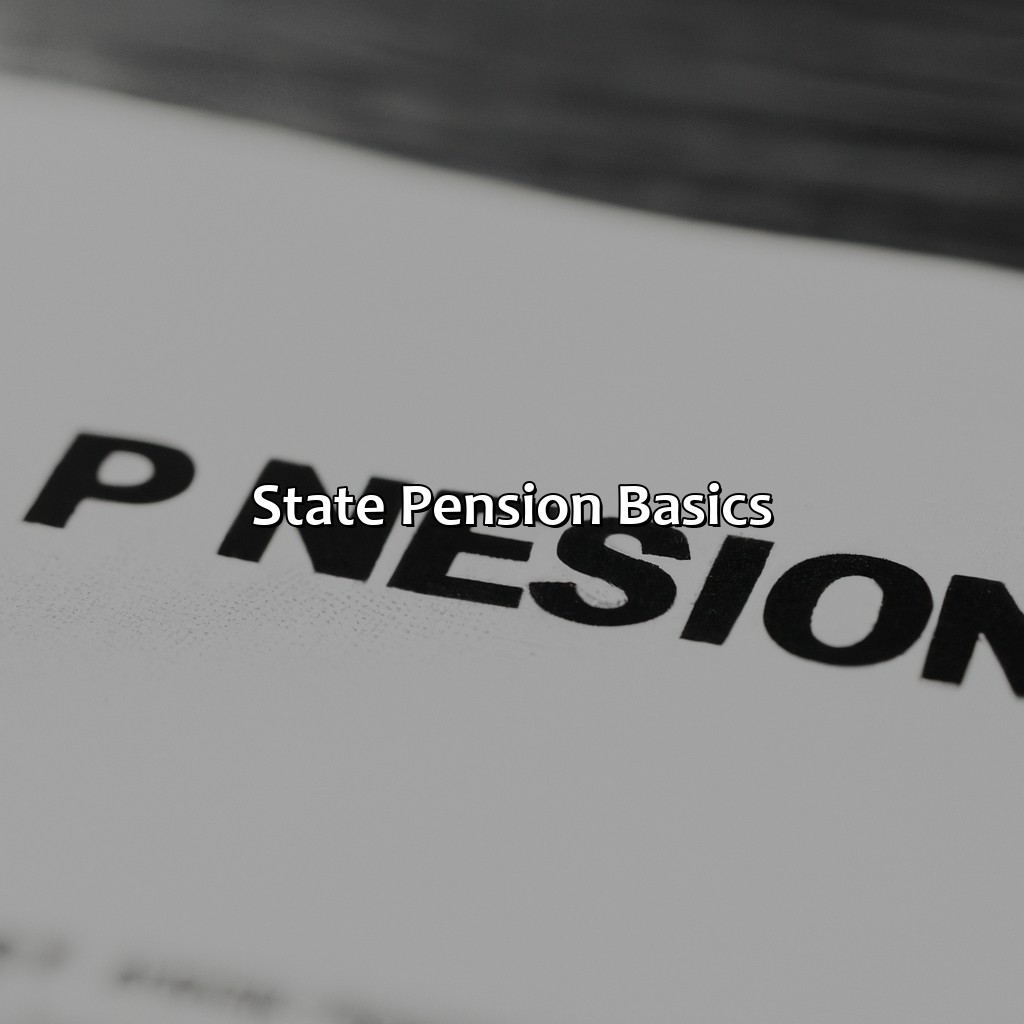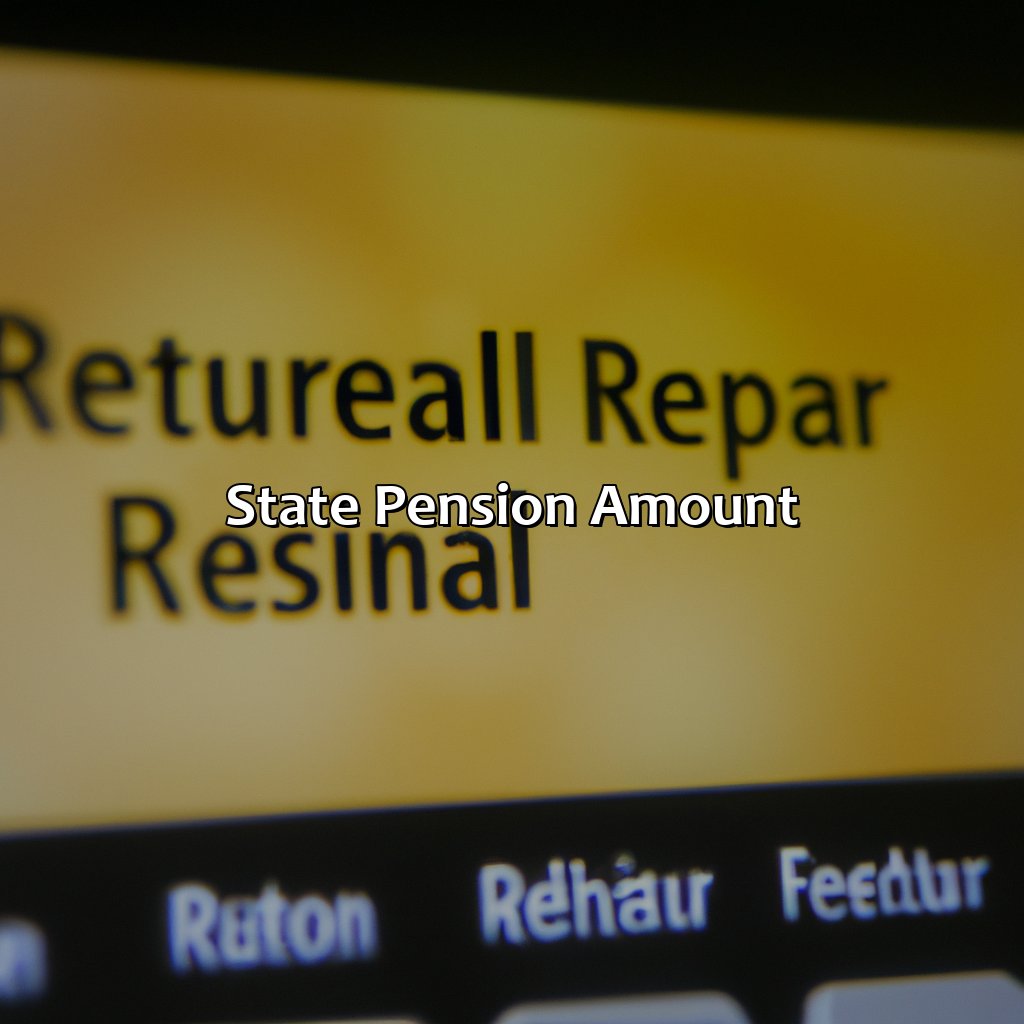What Will My State Pension Be?
Key Takeaway:
- Eligibility Criteria: To receive state pension, you must have made National Insurance (NI) contributions in the UK or qualifying overseas territories for a minimum period of 10 years. The amount of state pension you receive is based on the number of qualifying years you have built up.
- State Pension Age: The state pension age is changing, with gradual increases to the age at which you can receive your pension. The government has an online calculator to help people work out their state pension age.
- State Pension Amount: The amount you receive will depend on whether you are entitled to the Basic State Pension or the New State Pension. Your pension amount may also be affected by life events such as divorce or death of a partner, and pension credit may be available for low-income pensioners.
Are you concerned about your future financial security? Understand what your state pension will be with our comprehensive guide. You can take steps to ensure you will be financially secure in retirement.
State Pension Basics
In this section, you’ll dive deep to understand the fundamentals of the state pension. This includes eligibility criteria, how the pension is calculated, and voluntary NI contributions. It also explains how the pension qualification can differ depending on personal circumstances. Plus, learn how voluntary contributions can boost your pension entitlement!

Image credits: retiregenz.com by David Jones
Eligibility Criteria
To be eligible for the state pension, certain criteria must be met. These include having reached State Pension age, which varies depending on the individual’s date of birth and having made at least a minimum number of National Insurance contributions. Additionally, those who have been contracted out will receive a reduced pension.
Furthermore, it is important to note that those who have not developed qualifying years may not receive the full state pension amount. In such cases, individuals may consider making voluntary contributions to increase their eligibility. If you’re wondering when can you get your state pension, it’s crucial to plan ahead and ensure you have the necessary qualifying years.
It is also worth noting that eligibility criteria are subject to change and must therefore be kept under review.
In a similar case, there was an individual who had failed to pay enough National Insurance contributions in their early working years. As a result, they received a reduced state pension amount upon reaching retirement age. It is important for individuals to understand the eligibility criteria and plan ahead to avoid such scenarios.
Get your calculators ready folks, because we’re about to do some serious math on how little the government thinks we’re worth for our pension.
Calculation of Pension
The process of determining one’s retirement allowance is an essential aspect that every individual must understand. Knowing how your pension will be calculated can help you plan effectively and make better decisions. Here is a guide on how to determine your retirement allowance.
- Find out your National Insurance Contributions (NICs) – The first step to calculating your pension is finding out how much NICs you have paid throughout your working life. NICs help build up entitlement to the State Pension scheme.
- Check Your Entitlement – After identifying your NICs, you need to check your entitlement to State Pension from the United Kingdom government. The amount of basic State Pension you receive depends on many factors, such as age, class of NI payment, and years or credits accrued.
- Use the Government Calculator– Once you have figured out the above two steps, use the online government calculator to determine the exact amount of pension you can receive from the UK government based on different scenarios. For example, if you are eligible for both basic and additional pension rates.
It’s worth noting that if you retire before reaching 35 qualifying years of NIC, even if some are credited each year, this may affect how much money you can receive from the UK state pension scheme.
Lastly, according to a recent report by The Guardian UK in 2021: “The current state pension payout figure stands at 179.60 per week.” If you are wondering what happens to your state pension if you move abroad, it’s important to do your research and understand the different rules and regulations in place.
Why save for retirement when you can just rely on National Insurance to bail you out? Oh wait, you shouldn’t do that. Here’s why…
Voluntary National Insurance Contributions (NI)
Making additional contributions to the national insurance scheme is an option for individuals interested in increasing their state pension. These contributions could be made by self-employed persons, or those who may have gaps in their national insurance records.
By paying voluntary contributions, individuals can ensure they meet the minimum threshold of 10 qualifying years of National Insurance payments to receive a state pension. People under state retirement age can make up these payments for years when they didn’t work or didn’t contribute enough.
One thing to consider is the Voluntary Contribution (VC) rate varies depending on one’s national insurance record and age at which they apply for VC. Furthermore, if a person has had contracted-out deductions taken from their earnings, this will impact on how much they need to contribute to receive extra pension income.
A study by The Telegraph shows that despite reforms approximately half of UK pensioners do not qualify for the full basic state pension. If you’re wondering what is Category A state retirement pension, you can find more information on RetireGenz.
Growing old is mandatory, but waiting until your State Pension age to do it is optional.
State Pension Age
To know your State Pension Age, use the Changes in Retirement Age and Pension Age Calculator. Retirement Age alters frequently. Therefore, the Pension Age Calculator can help you figure out your State Pension Age.

Image credits: retiregenz.com by David Arnold
Changes in Retirement Age
As the world constantly evolves, so does the retirement age. It is important to note that the ‘age of retirement’ has changed over time and its future is highly unpredictable. The retirement age is dependent on various factors such as geographic location, job sector, and overall health status amongst others. With that being said, it s wise to predict future changes in retirement age by reviewing current trends within your industry or local area.
Retirement rules differ across nations and depend on a variety of personal factors like calculating social security benefits. So when selecting your retirement date take into consideration things like life expectancy, salary history, and working past 62 years old. You might also consider delaying social security past the point you are eligible. Doing that would result in increasing your benefits amount by 8 percent until you hit age 70. If you want to know when you will receive your state pension, visit RetireGenz.
In the event where one needs to bridge a pension deficit at a particular period there are numerous options that exist in consolidating debt or financial advisories from trustable funds. At such points it’s crucial to review upcoming changes annually so as not to get caught off-guard before embarking on major investments.
Jane made a huge blunder delayed her retirement for two years beyond her “full” Social Security era of 66 years old without any work earnings whatsoever only because she believed it would increase her monthly check payment. In reality however despite suspending payments during these two years she forfeited about $75K through such actions.
Find out when you can start enjoying your retirement and counting down the days until you can finally ditch those early morning alarms with our Pension Age Calculator.
Pension Age Calculator
Calculating your Age of Retirement Benefits
If you are nearing your retirement age, it is vital to calculate your state pension. Here is how you can use the Age of Retirement Calculator to get the estimated amount.
- Visit the official government website for calculating pensions.
- Fill in all fields, including date of birth, gender, and working years between 16 and state pension age.
- Give accurate answers on National Insurance contributions if any or Credits.
- Submit details and discover what you could receive from your older life-age pension benefits.
Remember that this calculator provides an estimate only. Factors such as future inflation rates might impact the final payment when they granted.
\n
Are you wondering when you should apply for old age pension? Use the Age of Retirement Calculator to get an estimated amount of your state pension benefits.
You should be mindful of how to receive payments from your pension across an extended timeline after analyzing your results. Consider additional sources of income or savings possibilities through retirement funds that might complement your non-State Pension work. If you are wondering how much you can earn while claiming State Pension, it’s important to do your research and plan accordingly for a comfortable retirement.
Making informed financial plans during retirement and utilizing other services available will help improve your overall long-term financial well-being.
Good news, your state pension amount won’t buy you a mansion but you might be able to afford a really fancy bird feeder.
State Pension Amount
To learn your state pension sum, take various elements into account. Estimate your pension with knowledge of the differences between the new state pension and the basic state pension. Life changes such as marriage, divorce, or illness can also affect your pension. Lastly, low-income pensioners might be eligible for pension credit, which increases their pension.

Image credits: retiregenz.com by Joel Washington
New State Pension vs. Basic State Pension
Distinguishing Between the Modern and Traditional State Pension
The state pension amount one receives depends on whether they are eligible for the New State Pension or Basic State Pension. The former is for citizens born after April 6, 1951, who have completed at least ten qualifying years of National Insurance contributions, while the latter covers individuals born before that date. To know more about what the UK state pension is, click here.
To help you comprehend clearly, here’s a table distinguishing between the two types of pensions:
| Criteria | New State Pension | Basic State Pension |
| Weekly rate in 2020/21 tax year | 175.20 per week | 134.25 per week (max) |
| Number of Qualifying Years Required for Full Payment | 35+ years | 30+ years |
| Pensions Fade-in Time | Fifteen years before reaching state pension age (SPA) | The full amount is generally paid at SPA. |
It’s noteworthy that those who are eligible for both pensions will be paid under whichever scheme offers them a higher payment.
In addition to these distinctions, it’s essential to examine each person’s unique situation with care to determine their actual entitlements. Citizens can do this by accessing their National Insurance records and verify how many qualifying years of contributions they have made.
Your pension amount may change due to life events, but at least death isn’t one of them…yet.
Effect of Life Events on Pension Amount
Life milestones and circumstances can have an impact on your state pension entitlement. These changes are unpredictable, but they may significantly affect the amount you will receive when the time comes. It is vital to consider them when planning for retirement.
For instance, marriage or civil partnership might increase your state pension contributions due to the Additional State Pension scheme. Conversely, divorce or dissolving of a civil partnership could also affect your entitlement if you were receiving based on either partner’s contributions previously. Additionally, caring for children or elderly relatives might lead to gaps in National Insurance contributions and could lower the pension amount. If you are wondering what does opt out of state pension mean, it is important to understand how these factors can impact your pension.
It’s also essential to check whether you’re eligible for any other benefits such as Pension Credit or Housing Benefit since these can support your retirement income.
To have more control over your state pension plan, make sure to keep track of all significant life events that might influence it financially and speak with a financial advisor if possible. Understanding how these situations impact your future pension ensures that you’ll receive the maximum amount that you’re entitled to, and help plan for a happy retirement.
Pension Credit for Low-Income Pensioners
Pensioners with low income can avail Pension Credit, which is essentially an addition to the State Pension fund. This fund aims to provide support and relief to those who need it the most. The amount of Pension Credit is determined by the level of one’s income and savings.
This credit offers numerous benefits such as free dental care, council tax reduction, and housing benefit. Although it s not taxable, it may have an impact on other benefits you receive. Keep in mind that any unused Pension Credit will be carried over to the next day.
It’s essential to note that once an individual receives Pension Credit, they are automatically enrolled into Savings Credit system. The Savings Credit provides additional income for people aged 65 or over who have saved up money for retirement. This system mainly helps those who have a modest income or savings. If you’re wondering how much you can earn while on Pension Credit, it’s important to understand the details of the Savings Credit system.
Pro Tip: If you’re still working beyond your State Pension age, it’s always a good idea to check if you’re eligible for Pension Credit as well as savings credit since it may help increase your overall income even further!
Wondering when does the state pension increase? Then consider checking out RetireGenz for more information.
Five Facts About State Pension:
- ✅ The current State Pension age is 66 for both men and women, but it is set to increase to 67 between 2026 and 2028. (Source: gov.uk)
- ✅ To receive the full State Pension, you must have at least 35 qualifying years of National Insurance contributions. (Source: Which?)
- ✅ The basic State Pension is currently 137.60 per week, but your actual amount may be more or less depending on your National Insurance history. (Source: Money Advice Service)
- ✅ You can check your State Pension forecast online to see how much you may be eligible to receive. (Source: gov.uk)
- ✅ You can defer taking your State Pension if you wish, and in doing so, you may be eligible to get extra payments when you do start claiming. (Source: Age UK)
FAQs about What Will My State Pension Be?
What will my state pension be?
Your state pension will depend on various factors, including your National Insurance (NI) contributions, your age, and your retirement plans. The current full new State Pension is 175.20 per week.
How can I check my state pension amount?
You can check your state pension amount by getting a State Pension statement. You can request a statement online or by phone. The statement will give you an estimate of how much State Pension you may get, based on your National Insurance contribution record as it stands on the date your statement is produced.
What is the new State Pension?
The new State Pension was introduced on 6 April 2016. The current full new State Pension is 175.20 per week (2021/22 tax year). It is a regular payment from the government that you can get when you reach State Pension age.
How can I increase my state pension amount?
You may be able to increase your state pension amount by paying additional National Insurance contributions, deferring your state pension, or claiming pension credit. It is advisable to seek professional advice before making any decision.
When can I start receiving my state pension?
The earliest you can start receiving your state pension is when you reach State Pension age. Your State Pension age depends on when you were born and your gender. You can check your State Pension Age here: https://www.gov.uk/guidance/check-your-state-pension-age.
What happens to my state pension if I live abroad?
Your state pension will still be paid if you live abroad. However, the amount you receive may be affected by the country you live in. You can find more information on how your state pension is affected by living abroad here: https://www.gov.uk/state-pension-if-you-retire-abroad.
